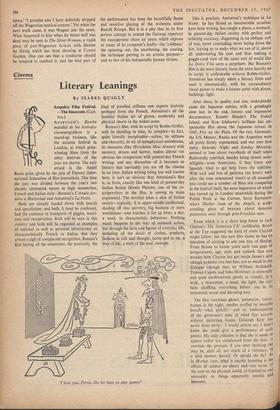Opera
Without Principles
By DAVID CAIRNS THE opportunism which eats like a canker at the heart of Strauss's genius is summed up in two incidents recounted, not without relish, in Friedelind Wagner's remarkable book The Royal Family of Bayreuth. The Jo first tells of Strauss cabling to the Festspielhaus to offer his services as con- ductor, a few hours after Toscanini had torn up his contract on learning that the manage- ment, under Nazi pressure, had banned Jewish musicians. The second concerns a letter (dis- covered by the Nazis) to his Jewish librettist Stefan Zweig, in which Strauss frankly expressed his contempt for the idiocy of all racialist theories.
He simply did not care either way; and his music, despite its great qualities, and whether one happens to like it or not, is just that—the music of a man without principles. In the crisis which overcame Western music with the gradual dissolution of tonality (a crisis making it neces- sary for a composer to expend much labour of spirit on determining what sort of music to write before he ever begins to write it) Strauss did not have the integrity to'create a style that was both personal and pure.
With all his audacity he lacked, as an artist, the courage to throw over his inheritance and take to the wilderness, like the mendicant Stravinsky (a composer born perhaps with a less abundant talent). With all his energy and clever- ness he did not have the strength of intellect to reshape the old in a new way, as Schoenberg did. Born ten years before Schoenberg and eighteen years before Stravinsky, he toyed with both tradition and modernism, too weak to defend the one, too pleasure-loving to embrace the other, and in the end able only to live off accumulated wealth and decorate the scene with his personality. In the twentieth century that is not enough for a great composer. In this sense only is it puritanical to object to Strauss's music: not because the works he wrote are often lush and luxuriant in style and texture, but because he failed to be true to his talent. With him, the musical question is a moral question.
The opportunism of Strauss's nature is clearly shown in The Correspondence of Richard Strauss and Hugo von Hofmannsthal, of which an Eng- lish version has lately appeared (Collins, 63s.). Quite apart from any parti pris, and whether or not you are interested in Strauss and the problems of opera, this is a superb book, as instructive and satisfying as anything that has come out on a musical subject for years, as absorbing as a novel, and worth every penny of its price. To read it is to be caught up completely in the details, artistic and personal, of their collaboration, the mercurial yet at the same time solid relationship between the proud, nervous, passionate, withdrawn, penetrat- ing, impulsive, fastidious, magnificently impres- sive, intensely attractive Hofmannsthal (sure of his creative judgment yet needing the reassurance of-Strauss's `good, kind' letters, putting out feelers towards personal contact but ready to take affront at the hint of a liberty) and the robust, enthusiastic, rash, shrewd, touchy, sensible and no less splendidly human Strauss. To read it is also to see Hofmannsthal time and again almost putting his finger on Strauss's weakness without realising it.
In a fascinating series of letters which plot the genesis and growth of Ariadne and Die Frau ohne Schatten and form the core of the book, we watch Hofmannsthal's hypersensitive antennae, at first perceptive of everything except the nature of Strauss's music, creeping towards the apprehen- sion of the truth. In 1912, after six years of partnership, he can still speak of 'those of our subjects . . . which treat of purification, of a Goethean atmosphere . . . in which your profound understanding has given me infinite satisfaction' . . . and of 'those massive, grandiose, wholly compelling qualities which chiefly distinguish you from every other living composer.' And in the same year, expressing sur- prise that Strauss should find it hard to set to music the character of Joseph in the ballet Jose phslegende—Strauss had written: 'Well, maybe there's a pious tune for good boy Joseph lying about in some atavistic recess of my appendix'—he can reply : The way you describe it, as the 'chaste' Joseph for whom a pious tune must be found, this character bores me too and I should be equally unable to find music for it. As I see him, you would have to look for the, music not in some atavistic recess of your appendix, but in the purest region of your brain, where the imagina- tion soars to the heights, to the pure, clear air of mountain glaciers, to keen, absolute intel- lectual freedom—a region to which, I know, you• readily and easily soar.
'What is best in our relation,' wrote Hofmann- sthal, '(is] our mutual sincerity.' It is this quality, that makes the peculiar interest of these wonder- ful letters. Whenever Strauss misunderstood the point Hofmannsthal would reply with long, lucid statements of belief which are among the finest artistic documents of our time (equally, Strauss's admirable good sense was of great service to Hofmannsthal). In a memorable letter he spelled out the meaning of Ariadne after Strauss had asked for `something more soaring—Freude schemer Gotterfunke' in the libretto at the end of the work. Gradually he came half to see that one of Strauss's besetting sins was what Busoni called a 'facility for spreading out what is small.' He had calculated that Der Rosenkavalier should be only half as long as Die Meistersinger: 'unless the music spreads itself very much at some point or other, each act ought to take three-quarters of an hour.' Seven years later, in a letter which was never sent, he exclaimed in irritation that the chorus of Faninal's servants in Act 2 was written to be rattled off in burlesque fashion, i.e., in the transparent Offenbach style; what you did was to smother it with heavy music and so utterly destroy the purpose of the words . . . similarly at the end of Act I. Out of the footmen who turn up one allcr, another . . . you have made a sort of brier chorus of huntsmen, which always strikes one as quite terrible at this juncture.
Of a passage in Die Fran ohne Schatten he writes:
Are we really to have yet another spinning out of the original passage? More and more! Must that be? My dear Dr. Strauss! However grand and beautiful this melody in E flat major is sure to be, do think about it twice! Remember our Wks; remember the conversa- tion we had in the park at Versailles, when you coined that striking simile of the magnifying cow's eye!
Hofmannsthal never ceased to admire Strauss, for his genius and for the human qualities that • complemented his own; and though he came to appreciate that 'the great danger of your life, to which you surrender and from which you try to escape in almost periodic cycles, is a neglect of all the higher standards of intellectual exis- tence,' he never realised its full implications.
Did Hofmannsthal, then, lead the bourgeois Strauss astray with his subtle refinements? 1 think not, on balance. Although he misjudged Strauss in supposing that his music could ever inhabit the lofty regions of the third act of Die Frau ohne Schatten, in general his influence worked on what was best in Strauss's artistic nature. Jt was his own weaknesses that prevented Strauss from taking the path Hofmannsthal pointed out for him and he himself wished to take. He was always wanting to become the Offenbach of the twentieth century. But his in- heritance stood in his way. Again and again such ' and such a work was to be 'my last romantic opera.' I promise you I have definitely stripped off the Wagnerian musical armour.' Yet when the next work came, it was Wagner just the same. What happened to him when his better half was dead may be seen in The Silent Woman, a vapid piece of post-Wagnerian fa-la-la with libretto by Zweig which has been showing at Covent Garden. One can see that a conductor should be tempted to conduct it, and the best part of the performance has been the beautifully fluent and sensitive playing of the orchestra under Rudolf Kempe. But it is a pity that in its first serious attempt to extend the German repertory the management chose an opera which exposes so many of its composer's faults—the 'coldness,' the spinning out, the smothering, the soaring, the technique purring to no artistic purpose— and so few of his indisputable human virtues.




































 Previous page
Previous page